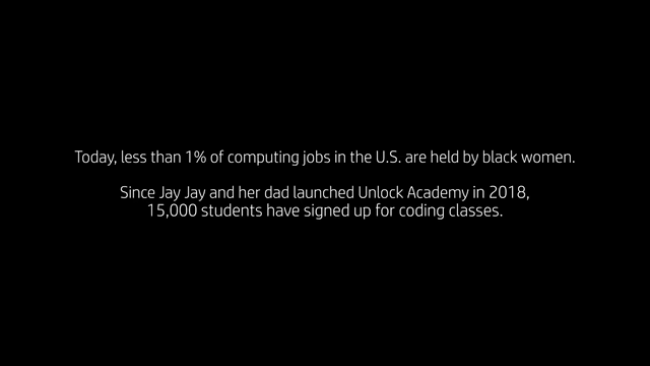Meet 16 Gen Z Leaders Who Are Making an Impact
Jay’Aina “Jay Jay” Patton, age 16, is one of many teens and young adults in Generation Z who have decided they are not going to wait for older generations. They are going to be, as the familiar saying goes, “the change you want to see in the world.”
Jay Jay has already inspired legions of Black techies and other young people to learn to code through the Unlock Academy, a digital coding school founded by her father, further spreading the potential for a different future.
“We make people feel like coding can be something for them,” Patton explains about the academy’s approach. “The most rewarding thing about it is the many things you can build and explore with it. You can change the world with this skill.” Jay Jay is the star of Generation Impact: The Coder, the first film in a new documentary series from the Garage by HP that shines a spotlight on creative members of Generation Z who are helping their communities — and the world — through their ingenuity and technology skills.
“I want to help people through different obstacles,” Patton says. “I want to make a difference and inspire people to make changes.”
She is a shining example of the newest cohort coming into the workforce, one that is entering adulthood and shaking up traditional definitions of communication, consumerism, activism, and what it means to build a career of meaningful work. Generation Z, born between 1997 and 2012, is using their innate technological savvy to reckon with injustices and reshape the institutions of generations before them—with a style that’s wholly their own.
The oldest Gen Zers are graduating from college or starting their working life, while the youngest are approaching an age when they will have some impact on household spending choices, and very soon will be making their own purchases. The pandemic is proving to be a defining moment in their lives, as new data show the effects of economic uncertainty playing out in a generation that’s more likely to be frugal, practical, and risk averse.
In trying to identify what makes Gen Z different from earlier generations, sociologists and researchers point to a number of factors. Technology, of course, plays a pivotal role. While the introduction of the laptop and the mobile phone had an enormous impact on earlier generations, Gen Z is more likely to reimagine today’s digital devices and what they can do, rather than be shaped by them.
Like their counterparts worldwide, members of Gen Z in the United States often reject labels and are a more pluralistic cohort than any before them. They’re more racially and ethnically diverse than previous generations, and roughly half of them view binary gender labels as outdated. In a survey by Ernst & Young, only one in five members of Gen Z say they are interested in politics, yet at the same time, some 60% are very worried about climate change. They see themselves as increasingly being called to action, both environmentally and socially. Daryl Butler, HP’s global head of marketing for Gaming Systems & Services, has a unique perspective on Gen Z, having both worked alongside them and also stood by them in social justice organizing. “I think young people have basically said, ‘Enough of that,’ ” Butler explains. “ ‘We’re not going to rely on the system to fix the problems. We’re going to fix them ourselves. We’re going to mobilize, and we’re going to be more active at the voting booth.’ ”
Their activism and engagement extend beyond the political sphere, with majorities of Gen Z consumers indicating they want to support companies that are inclusive and that help consumers engage with social issues.
“They’re also holding brands more accountable,” Butler continues, “and using their wallets as tools to effect change. I think that’s one of the things that’s really materially different.”
We recognize 15 inspiring Gen Zers in addition to Patton who are working to make the world a better place. Their methods are wide-ranging—some tap into grassroots organizing, while others raise awareness with elegant tech-based solutions. Together, they represent a cross section of the biggest challenges they’ve inherited: climate change, plastics pollution, lack of health care for Indigenous people, violence against women, and social injustice. During a period in history where it is easy to be pessimistic about the planet’s future, they are much-needed sources of hope.
Read the full blog on the HP Inc. Garage Blog



